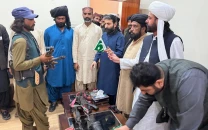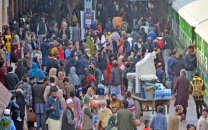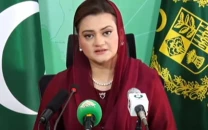Saudi hiccups
This latest coalition move by the Saudis is an attempt by the kingdom to regain its centrality in the Islamic world

The writer is National desk
in-charge at The Express Tribune.
He tweets @hammadsarfraz
As news trickled in about Pakistan’s surreptitious entry into the coalition, the reaction in Islamabad was muted at best. The Foreign Office initially chose to remain silent, an admission that it was resoundingly perplexed by the announcement — a feature fast becoming a norm. Only on the second day did the foreign secretary reveal that Islamabad had not been consulted and that it had sought clarifications in this regard. By day three, the Foreign Office had taken a u-turn by congratulating the Saudis and announcing that Pakistan was indeed a part of the coalition. The ISPR, too, demonstrated none of its usual alacrity; it was as if the news had been brushed under the proverbial carpet. The whole episode was eerily reminiscent of the way the Yemen imbroglio had panned out.
As they go, military coalitions are important affairs. They coalesce allies and help project both strength and resolve. Given the importance of such coalitions, they are usually announced with a fair amount of ballast with representatives of participating countries present. So it would not be unjustified to characterise this latest Saudi foray into coalition-building as both amateur and unconvincing. First, the announcement was made by the deputy crown prince, not the king or the crown prince. Second, not a single representative of participating countries was present, not even the ambassadors. Instead, a row of flags at the background were thought to be enough. Lastly, and perhaps most importantly, the announcement failed to clearly define any goals for the coalition. Was this alliance against the Islamic State (IS)? Who were the terrorists and how would the coalition proceed? Perhaps, the only concrete announcement by the Saudis was the setting up of a joint coordination centre in Riyadh.
It is no surprise then that most Saudi watchers see this latest coalition move as an attempt by the oil-rich kingdom to regain its centrality in the Islamic world — one in which a resurgent Iran and a steadfast Turkey are fast eroding Saudi influence. But announcing military coalitions without securing complete backing of member countries is making Saudi Arabia look weak. Pushing Pakistan to publicly position itself squarely in Riyadh’s camp isn’t helping matters either. Post-Yemen, Pakistan’s military leadership is reported to have assured the Saudis of its support in anti-terror operations, but supporting the Arabian Peninsula and Gulf countries in their campaign against terrorism is not the same as joining a military coalition, especially when such a coalition excludes Iran, Iraq and Syria — countries at the forefront of the fight against IS. Instead, positioning Pakistan amidst such a coalition would naturally raise concerns in Tehran and Moscow — two capitals Islamabad is keen to court. Wisely, both Islamabad and Rawalpindi have given clear signals that they would not like to intervene in a Middle East spiralling into crisis, particularly as Pakistan pushes to mend fences in its own region.
Another worrying concern about the Saudi announcement is that as Pakistan publicly, and other countries perhaps privately, voiced their bewilderment at the announcement, Saudi Arabia looked as if it were playing in an amateur league. This will not sit well with the many seasoned members of the royal household that might read this as a dent to the kingdom’s perceived importance. With voices of discontent rising within the kingdom against the unprecedented powers Prince Mohammad bin Salman enjoys under his father’s reign, the demonstration of his inexperience on the diplomatic front is likely to exacerbate disagreements. As we enter into what promises to be a vastly more complicated and precarious Middle East in 2016, the balance of power within the kingdom and Saudi Arabia’s ability to project power in the Arab world should be observed as keenly as the unfolding events in Syria.
Published in The Express Tribune, December 20th, 2015.
Like Opinion & Editorial on Facebook, follow @ETOpEd on Twitter to receive all updates on all our daily pieces.



















COMMENTS
Comments are moderated and generally will be posted if they are on-topic and not abusive.
For more information, please see our Comments FAQ